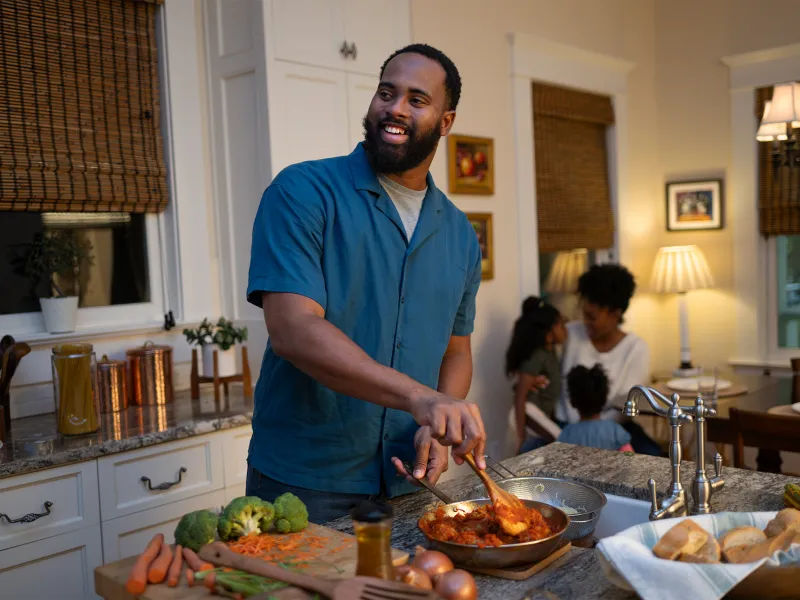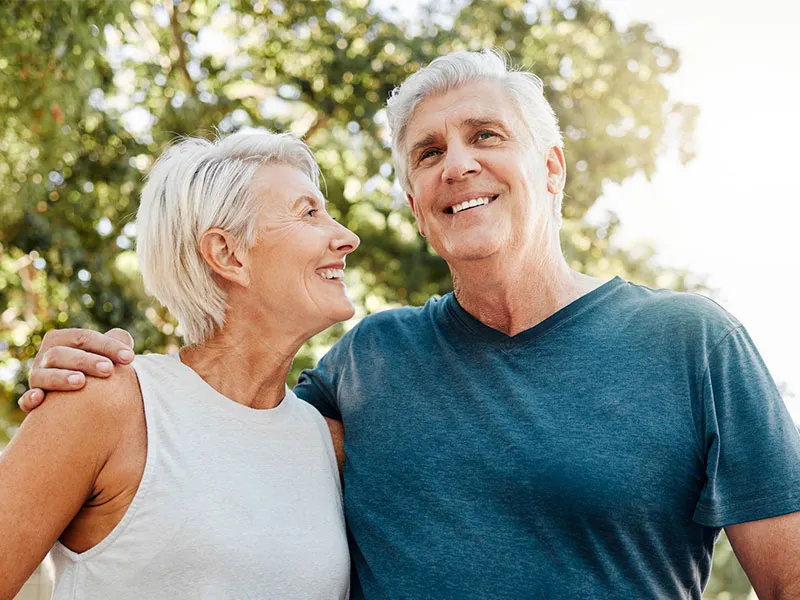
A Clear View for a Healthier You
A colonoscopy is more than a screening — it’s one of the most effective ways to protect your future health and test for colon cancer. Our team is here to answer your questions and help you feel prepared, so your experience is as easy and comfortable as possible.
Preventing Colon Cancer Before It Starts
A colonoscopy is a common and important procedure performed by a gastroenterologist to closely examine the inside of your colon. Using a long, flexible tube with a tiny camera at the tip, your doctor gently guides the scope through your colon to look for potential concerns. If your doctor finds any polyps, they'll typically remove them during the procedure. Even though not all polyps are precancerous, removing them is a proactive way to help prevent them from growing larger or potentially developing into colon cancer.
What to Expect When You’re Getting a Colonoscopy
When you arrive for your colonoscopy, you will be taken to a pre-operative bay before your procedure, where you'll meet your GI doctor and anesthesia team. During this time, your care team will discuss the risks and benefits of the procedure with you, answer any questions you may have and have you or your legal guardian sign consent forms.
While the colonoscopy itself usually takes less than 30 minutes, your doctor may need additional time to find and remove any found polyps. From check-in to recovery, the entire process can take several hours. To ensure you're fully prepared and have time to rest afterward, we recommend setting aside up to half a day for your appointment.
After your procedure, you’ll rest in a recovery area where a nurse monitors your vitals and ensures you wake up comfortably. Once you're awake and alert, your doctor will review the results with you. If polyps were removed, they’ll be sent to a lab for testing, which may take up to a week.
Because you’ll receive anesthesia, you’ll need a trusted adult to drive you home — rideshare services or public transportation aren’t permitted. Once home, take it easy for the remainder of the day. Avoid driving, working, operating machinery or making important decisions until the following day.
Preparing for Your Colonoscopy
Get tips on foods to avoid before your colonoscopy, maintaining a clear liquid diet, pre-procedure medication use and more.

Colonoscopy Scheduling Made Easier
A direct access colonoscopy allows eligible patients to schedule their colonoscopy without needing a prior consultation with a gastroenterologist. This streamlined option is ideal for people who prefer to avoid multiple appointments.
Healthy adults 45 and older and individuals with a positive Cologuard or FIT test may qualify for direct access. To find out if you're eligible, you can request a referral from your primary care provider or contact a participating GI office directly to schedule an appointment with the provider or location of your choice.
If you'd prefer to meet with a GI specialist before your procedure, that option is always available.
Answering Your Colonoscopy Questions
-
Q:Question: Why is colonoscopy prep important?
A:Answer:Your doctor will need to look carefully at the lining of your colon to check for precancerous polyps or other abnormalities. If stool (poop) is left in the colon, this will block your doctor’s view and your test may need to be rescheduled. It's important to thoroughly prep for your colonoscopy to help flush all of the stool from your colon so your doctor can complete the exam.
-
Q:Question: Why do I need to follow a special diet before the colonoscopy?
A:Answer:Certain foods, like corn, take a while to clear out of your colon. These foods, known as high-residue foods, can stay in the colon for up to a week and are not easily cleared out even with colonoscopy prep. To give your doctor the best view of the inside of your colon, you'll need to be on a low-residue diet for the week leading up to your colonoscopy. If leftover food blocks your doctor's view of the colon, your colonoscopy (and the prep) may need to be repeated.
Twenty-four hours before the colonoscopy, you'll transition to a clear liquid diet. You will not be able to eat solid food during this period. This helps ensure that your colon is completely clear for your procedure. You may be able to continue clear liquids up to two hours before your colonoscopy, but be sure to follow any specific guidelines from your doctor. After that time, you cannot drink anything further until after your procedure.
-
Q:Question: Is coffee considered a clear liquid?
A:Answer:Black coffee is considered a clear liquid and is acceptable to drink during your prep as long as it does not contain coffee grounds or any dairy or dairy-alternative products, like milk or creamer.
-
Q:Question: My poop looks almost clear, can I stop drinking prep now?
A:Answer:It’s important to follow colonoscopy prep instructions as directed. Even if your stool looks clear to you, there may still be stool remaining in your colon. Keep drinking all of the prep until it’s completely finished.
-
Q:Question: The colonoscopy prep is making me feel nauseous, what can I do now?
A:Answer:If you feel nauseous from the colonoscopy prep, you may take a 15 to 30-minute break from drinking it, and then resume drinking it. Refrigerating the prep may also make it less likely to make you feel nauseous. If your nausea continues or if you have any vomiting, contact your doctor, who may prescribe an anti-nausea medication for you to take.
-
Q:Question: Why is a colonoscopy important?
A:Answer:Colon cancer is the second leading cause of cancer-related deaths worldwide. Colonoscopies save lives by allowing your doctor to find and remove precancerous polyps before they turn into colon cancer. Because colon cancer is so common, everyone should have regular colonoscopies. Average-risk patients (patients without GI symptoms or a family history of colon cancer) should undergo colonoscopy starting at age 45.
-
Q:Question: How long does a colonoscopy take?
A:Answer:Although the colonoscopy itself typically takes less than 30 minutes, your doctor may need extra time to remove any polyps they may find. From check-in through recovery, the full visit can last several hours. To help you feel prepared and allow time to rest afterward, we recommend planning to spend up to half a day at your appointment.
-
Q:Question: Is a colonoscopy painful?
A:Answer:An anesthesia care team will work with your GI doctor to ensure you are comfortable and most likely sleeping during your colonoscopy. Most patients do not remember any of the procedure. You should not have any pain after the procedure, although you may have some temporary bloating or cramping. These symptoms will resolve over a few hours, especially once you start walking around.
-
Q:Question: How often will I need to have colonoscopies after my first one?
A:Answer:If no polyps or other potential concerns were seen during the colonoscopy and your doctor got a good look at the inside of your colon, you may not need a colonoscopy for up to 10 years. If your doctor found precancerous polyps or if the inside of your colon was not thoroughly cleared, they may recommend repeating the colonoscopy sooner. It's important that you keep getting regular colonoscopies, as new polyps can form or small polyps may have been missed.
-
Q:Question: How can I prepare for my colonoscopy?
A:Answer:After scheduling your colonoscopy, you'll receive specific procedure instructions from your doctor’s team. Please read these instructions carefully ahead of time, as they may recommend starting a special diet or stopping certain medications up to a week prior to the procedure. It's important to follow the diet and prep instructions so the inside of your colon can be as clean as possible. The prep will flush stool out of your colon so that the inside lining of your colon can be seen. A cleaner colon will make it easier for your doctor to find and remove polyps. Your doctor will send a prescription for the colonoscopy prep to your pharmacy. Pick it up or fulfill it several days before the procedure to ensure you can start your prep on time. Please follow your physician’s instructions.
Continue ReadingCollapse AnswerYou should notify your care team before the procedure if you have a pacemaker or if you are taking any blood-thinning medications, dialysis, diabetes medications or weight-loss medications, so they can give you specific instructions for these.
-
Q:Question: What should I bring for my colonoscopy?
A:Answer:You should bring your cell phone, ID and insurance card with you to your procedure. You should also have a trusted adult to chaperone, as you will need them to take you home after the procedure. Please leave any valuables or jewelry at home. If you wear contact lenses, consider wearing glasses for the procedure if you have them.
-
Q:Question: Can I take medications the day of my procedure?
A:Answer:You may take small sips of water with most of your usual prescription medications on the day of the procedure. If you take blood thinners, diabetes medications or weight-loss medications, please follow the instructions given by your care team, as you may need to wait to take these until after your procedure.
Take Charge of Your Digestive Health
Prioritizing your health starts with preventive care. A colonoscopy is a powerful tool to detect potential concerns early and protect your health for years to come. Schedule your screening today to get started.
